Social and Relationship Capital
Tata Steel values continuous stakeholder engagement for business growth and sustainability, nurturing long-term relationships with them through well-established and evolving forums, ensuring lasting collaboration and mutual success.
Key highlights in FY2023-24 (for Tata Steel Limited)
86.1
Customer
Satisfaction Index
216
Supply chain
partners assessed
`3.60
Dividend to shareholder
(per equity share)
Fostering community for
positive social impact
At Tata Steel, the value creation model integrates business and sustainability. The approach on Corporate Social Responsibility bridges socio-economic gaps in the communities amongst the most vulnerable and voiceless residing in remote locations of Jharkhand, Odisha, Maharashtra, Uttar Pradesh, Punjab and West Bengal. Implemented through Tata Steel Foundation, the development initiatives seek to strengthen human, natural and cultural capital in the ecosystem. The Foundation enables 120 scalable models of change, with the best of talents and like-minded partners in the development space, creating an impact on 4.4 million lives in FY2023-24. Deep-rooted social and relationship capital with the communities has been underpinned, with emphasis on replication and saturation of programmes across geographies, development of changemakers in communities, unlocking of public and private capital, and environment protection and conservation.
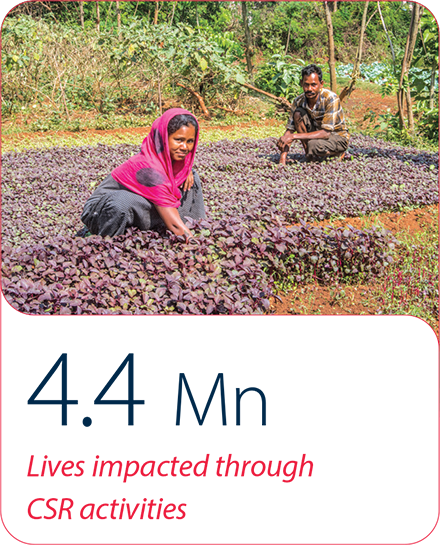
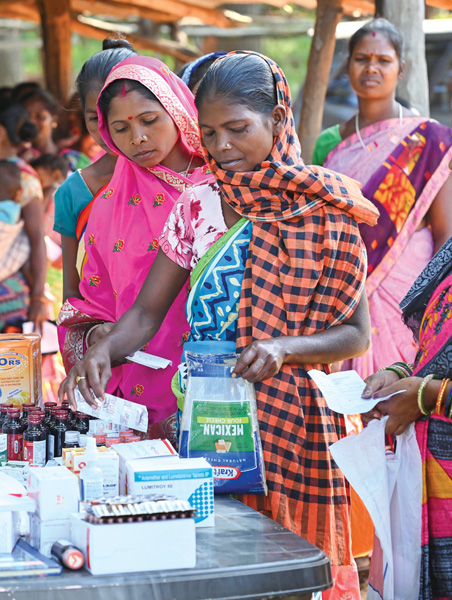
Attaining geographic saturation
(a) Maternal and Newborn Survival Initiative (MANSI+) ensured 100% coverage in three districts of Kolhan division in Jharkhand;
(b) Keonjhar district of Odisha became the first district to declare itself a Child Labour-free Zone through the Education Signature Programme;
(c) SABAL – dignity through ability, reached a 100% disability entitlements coverage at Noamundi block in Jharkhand
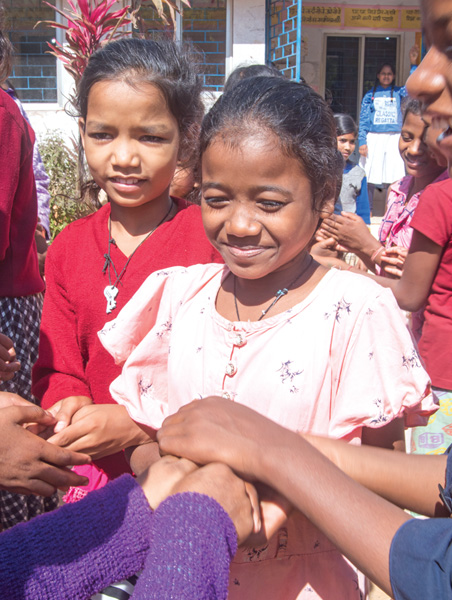
Replicating programme model
(a) MANSI+ replicated in the entire Gumla district of Jharkhand;
(b) Education Signature Programme replicated in 25 public schools of Ranipet district of Tamil Nadu;
(c) 50 new gram panchayats formally consented to replicate the Development Corridor model on governance
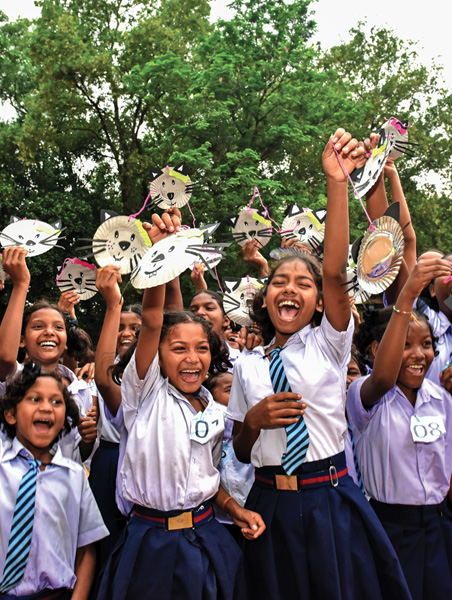
Unlocking public capital
Over `8,200 crore worth of public entitlements unlocked through the Education Signature Programme, Development Corridor project, and Urban Slum Development project (Jaga Mission).
Development programmes undertaken in FY2023-24 and their impact
National Change Models
Actualise national change models which address core development gaps in India, while being replicable in the global context.
Tata Steel Foundation has built large scale change models which (i) address development challenges that are national priorities, (ii) are designed with audacious theories of change, (iii) have demonstrated record of population level outcomes, (iv) are being replicated across India and can be instructive in the global context.
>1.4 Mn
lives have been impacted through
national change models in
FY2023-24
Signature Programmes
Ensuring societal priority to the health and survival of women and children before, during and after childbirth (MANSI+).
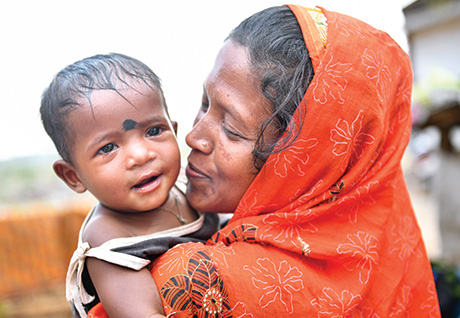
Impact
- 2.4 lakh+ women, children, and adolescents impacted
- 48% increase in high-risk cases identification and 175% increase in case resolution among women and children
- Institutional delivery enabled among 87% (of 7,149) high-risk pregnant women
- 2,986 married adolescent girls successfully delayed pregnancy
Universalising secondary education for all children through a revitalised public education system
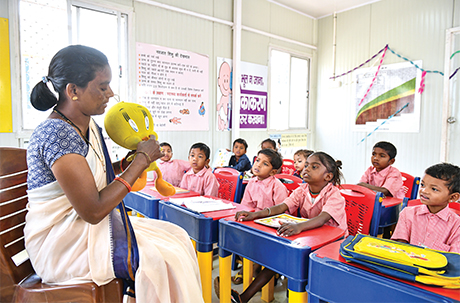
Impact
- 7.2 lakh+ children impacted under Education Signature Programme
- 6,932 out-of-school children brought back to school
- 284 gram panchayats declared themselves as Child Labour-free Zones
- 39,789 school children engaged in courses on traditional knowledge and culture
- 1.9 lakh+ learners across 3,571 schools covered through digitisation initiatives

Fostering an ecosystem of constructive dialogue, change and changemakers for tribal communities of India

Impact
- 3,840 participants from 150+ tribes convened through Samvaad Conclave and Regional Samvaad
- 40,640 tribal language learners in 10 languages - India’s largest programme on learning of languages. These languages have been introduced in curriculums of 56 schools
- `29.12 lakh turnover generated by tribal artisans from 11 editions of Johar Haat
- 86 film screenings to promote tribal elements
- 212 intellectual properties created in the form of documents, videos, books, etc.
- 105 individual leaders mentored through Tribal Leadership Programme and Samvaad Fellowship
Developing a vibrant Jamshedpur Kalinganagar corridor where local communities participate in and bring about a significant enhancement in their human, social natural and cultural capital
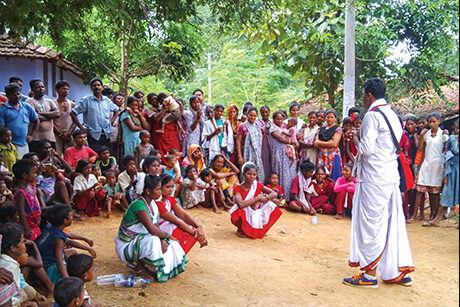
Impact
- ₹48.43 crore unlocked through public entitlements by 44,039 individuals
- 68 gram panchayats organised regular gram sabha
- 375 Village Development Plans (VDP) prepared with participation of women
- 170+ VDP indicators mapped against UN and localised SDGs
- 39 corridor fellows enrolled in certification course at IIM Ranchi
Regional Change Models
Build regional change models which enable lasting betterment in the well-being of communities, prioritising those who are excluded and proximate.
Tata Steel Foundation has built change models which (i) address development challenges unique to climate, context and vulnerability profiles of specific regions, (ii) are designed with localised theories of change, (iii) are implemented at an impact appropriate scale, (iv) bring together local ecosystems and help build social capital around themes.
>3 Mn
lives have been impacted
through Regional Change
Models in
FY 2023-24
Ensuring increase in aggregate, real annual income for marginalised and excluded households through agricultural and agri-allied activities
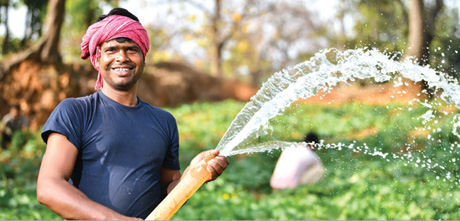
Impact
- 120% increase in income of 90,918 farmers
- 18,449 farmers engaged in climate resilient agriculture practices for sustainable livelihoods
- 1,387 on-farm and off-farm micro enterprises developed by farmers for livelihoods generation
- 8,371 farmers linked to government schemes
- 1,203 community institutions formed by farmers for collective management of agricultural activities
- 25 value chain units established for sorting, grading and processing of farm produce
Ensuring a sustainable career path with stable income enhancement for youth from marginalised and excluded households through multiple skilling and employment opportunities
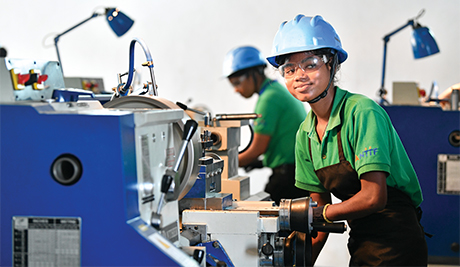
Impact
- 3,176 trainees placed/self-employed through long and short-term trainings
- 287 youth linked to employment opportunities through Model Career Center (MCC)
- 4.5x scale up in placements across long and short-term institutions
- 2 Industrial Training Institutes and 4 Multi-skill Development Centres established
Empowering rural women with a platform that provides access to economic resources
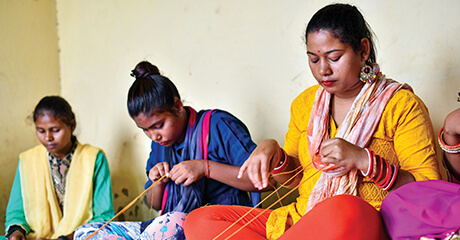
Impact
- 17,113 women engaged in Self Help Groups (SHGs) and corpus built for ~`7.4 crore
- 3,092 women engaged in micro-enterprises
- 135 new enterprises initiated by SHG women for livelihoods generation
- 282 artisans engaged through women cooperatives with an annual turnover of ~`80 lakh
Developing community managed water ecosystems
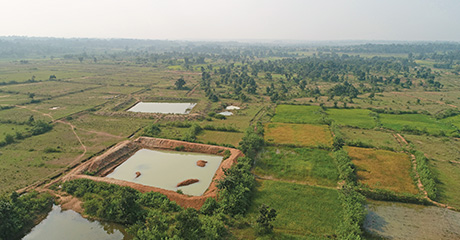
Impact
- 107.8 million cubic feet water storage capacity created through development and management of 1,114 water harvesting structures
- 780 hectares of land treated with soil and moisture conservation
- 4,500 hectares of watersheds area geo-tagged (GIS system)
- 2,106 hectares of land under irrigation coverage through watersheds
- 508 community water institutions
- 1.9 lakh+ people gained access to drinking water
Enable optimum health of community through provision of healthcare services and health education
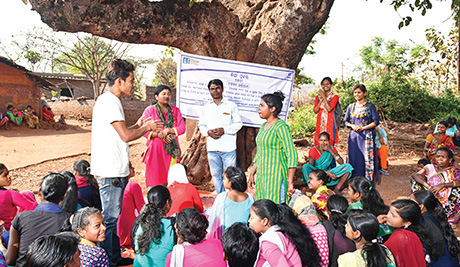
Impact
- 56,826 adolescents trained in Adolescent Reproductive and Sexual Health (ARSH) module
- 31,045 girls successfully delayed early age marriage
- 584 young changemakers developed towards Regional Initiative for safe Sexual Health for Today’s Adolescents
- 3,866 cataract surgeries conducted
- 2.2 lakh+ individuals screened for Non-communicable Diseases
- 4.6 lakh+ individuals screened for fever and vector borne diseases
- 10,671 household nutrition gardens developed
- 14,400+ individuals trained on Basic Life Support skills
Enabling women with leadership potential to have an effective voice in community decision-making processes
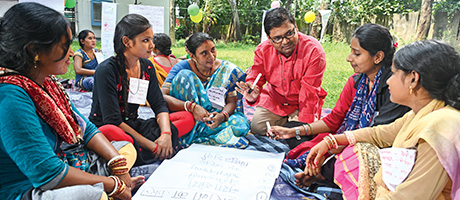
Impact
- 3,025 women enrolled in DISHA programme
- 1,914 women completed all training modules in leadership
- 3,085 women actively participated in rural institutions
- 343 trained women represented at decision-making positions in rural institutions
- 160 We for Change initiatives were undertaken by women
- 958 women engaged in Digital Literacy programme
Developing an ecosystem that fosters self-reliance and a life of dignity for all Persons with Disability (PwD)
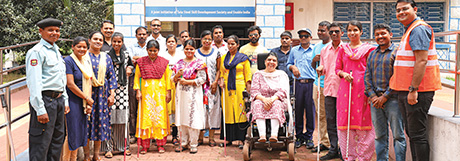
Impact
- 7,900+ PwDs covered through initiatives for self-reliance
- 2,101 Anganwadi Workers, District Programme Officers and NGO members capacitated
- 2,763 PwDs linked to government schemes
Developing infrastructure that improves standards of living among communities
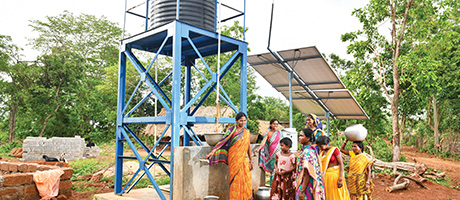
Impact
- 1.8 lakh+ beneficiaries of infrastructure projects
- 497 rural infrastructures created/renovated
- 947 structures developed with renewable energy footprint
Support universalisation of secondary education for children from Dalit and tribal communities and enable an adequate standard of living

Impact
- 10,283 Dalit and tribal students felicitated with Jyoti Fellowship
- 170 Tata Steel Scholars across 30 institutions
- 512 Particularly Vulnerable Tribal Group learners under Akanksha programme and 12 matriculate children linked to higher/ professional education
Build community connect through sports and nurture sporting talent at grassroots level
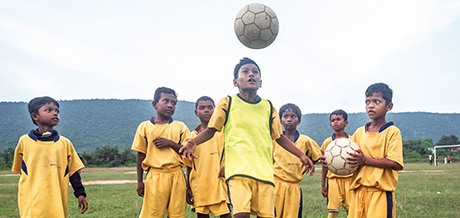
Impact
- 36,000+ individuals engaged in sporting activities
- 3,937 children/youth engaged in grassroots sports
- 268 participations at state and national-level tournaments
Facilitate all children in all villages to complete secondary education and receive guidance for future study or vocation
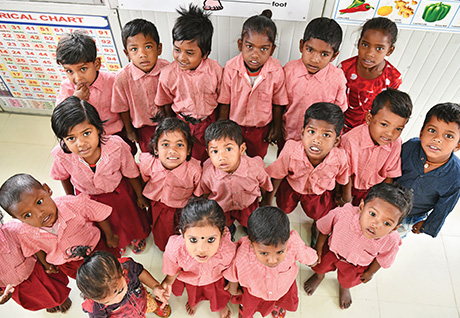
Impact
- Masti Ki Pathshala
- 1,170 children mainstreamed to public schools
- STEM learning initiated with 300 children
- 2,330 children engaged in Foundational Learning and Numeracy initiative
- Other programmes
- 9,300 learners under 71 Pre-matriculate Coaching centres
- 3,055 learners enhanced their capability through English and Computer classes across 21 centres
- 23,723 children from Green School initiative undertook projects on water, waste, energy, biodiversity and forests
Embed a societal perspective in key business decisions
Leveraging employee volunteering to address social issues in the communities the Company serves
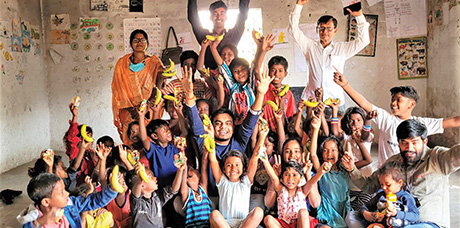
Impact
- 1.57 per capita Volunteering Hour recorded (67,799 total hours)
- 450 social issues addressed
- 6,822 unique volunteers engaged
Engendering a cadre of business leaders who embody a societal perspective in their business decisions
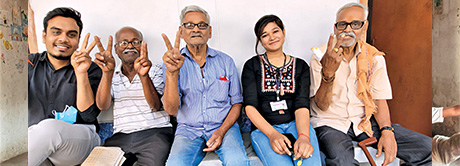
Impact
- 1,241 individuals undergone social immersion (senior leaders, students and Tata Steel Management Trainees)
Tata Steel's community development initiatives aim to deepen the Company's relationship with key stakeholders, including community and other networks, securing social licence to operate for the organisation.
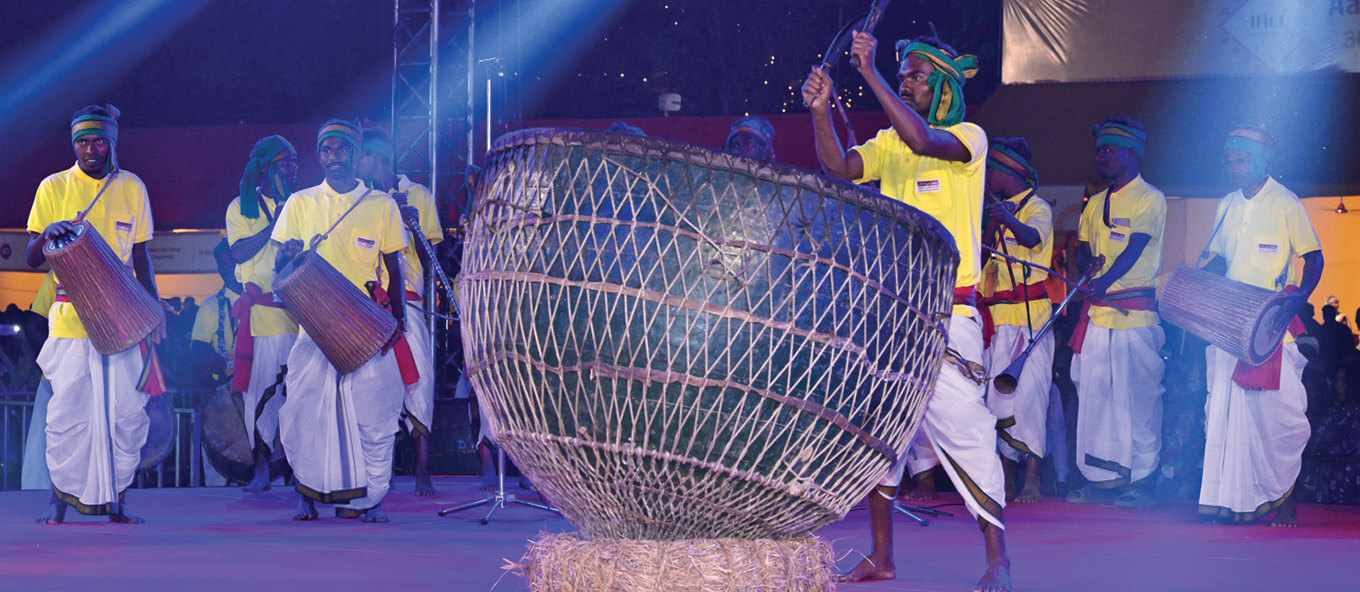
Samvaad
Since 2014, Samvaad has emerged as an ecosystem that brings together tribes of India and beyond for constructive dialogue. It enables critical elements of tribal identity to thrive, be celebrated, and fed into the dialogue, fostering youth peer groups that drive positive change. It has brought together over 40,000+ people from 200+ tribes across India and 17 other countries, who have reinstated faith in the Samvaad ecosystem, time and again, in impartial contemplation of tribal narratives, balanced with a celebration of rich tribal culture, music, folklore and beyond.
This ecosystem, each year, is held together by an underlying theme that is contextual and resonant for dialogue throughout the year and the five-day annual event held in November. The theme has matured from specific domains like tribal languages, leadership, culture, and healing practices, among others, leading to broader pivots of conversations on Tribalism Today and Coming Together for Social Change.
The 10th edition of Samvaad conclave was inaugurated on November 15, 2023, at Gopal Maidan, Jamshedpur to the beats of 251 nagadas, dhols and musical instruments filling the ground with the tribal artists, dignitaries and delegates joined in circles to tap their foot to the rhythmic beats. This day also commemorates the birth anniversary of Dharti Aaba Birsa Munda, the iconic tribal freedom fighter of Jharkhand.
The theme for the year – ‘Walk with Me’ – recognised the journey of ideas, individuals, and collectives from and amongst the tribes of India. The theme was aligned to the conversations and dialogues that have been unfolding at the Samvaad conclave over the past decade, and how they are poised to resolve the challenges that lie ahead, with shared wisdom, exchange of ideas and self-learning.
Relationship Capital
Tata Steel's stakeholders across multiple industries, geographies, and communities define its identity and help pave the way for its journey to becoming the most valuable and respected steel company globally. In addition to the Materiality Assessment exercise, the Company regularly engages with its stakeholders through focused groups or individually, using various tools, mediums, and platforms. Their insights help navigate challenges, seek opportunities, and lay the foundation for a more inclusive and sustainable future.

The investors and lenders play a crucial role in providing financial capital for Tata Steel's growth and transformation into a sustainable steel company. Tata Steel's value proposition revolves around delivering consistent returns on investment by leveraging highly profitable assets in India and benefitting from an integrated value chain. The Company is committed to reducing debt and financing profitable growth. This approach is complemented by Tata Steel's dedication to improved disclosures, transparency, and credibility in both financial and non-financial information to ensure that stakeholders are well-informed and confident in their investments.
Tata Steel engages with investors and analysts through various mediums such as annual reports, media updates, earnings calls, periodic meetings, and shareholder meetings to facilitate direct communication and seek feedback.
The interactions primarily focus on the Company's efforts to achieve strong operating and financial performance to meet Investment-Grade financial metrics. There is also a significant emphasis on ESG (Environmental, Social and Governance) commitments and making transparent disclosures in these areas. This approach highlights the commitment of the Company towards not only the financial health but also sustainable and responsible business practices.

During FY2023-24, the Company has scheduled six court convened meetings and Annual General Meeting for its shareholders.
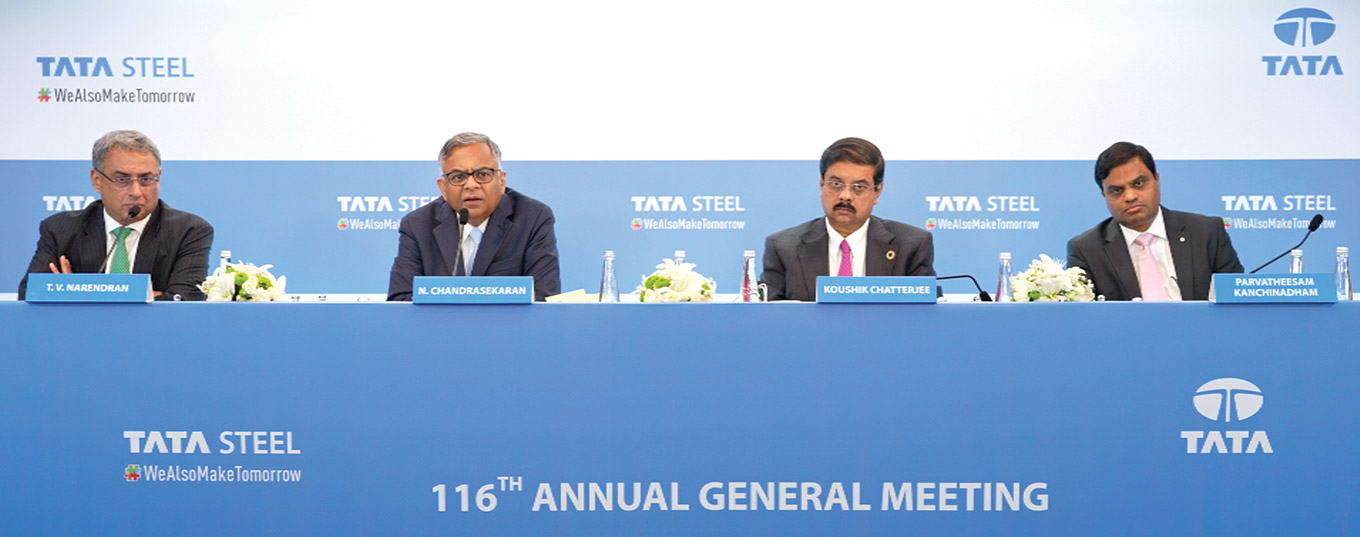
Building long-term mutually beneficial collaborative relationships with customers ensures that Tata Steel attains and retains market leadership in chosen segments. Being customer-centric, Tata Steel focuses on creating strong brands and differentiated products and services. It intends to remain its customers' trusted partner through reliable supply chains across its geographies.
Tata Steel utilises various physical and digital methods to engage with customers and understand their needs. These include customer service teams, regular meetings with senior leadership, the ECAfez website portal and the DigECA app for MSMEs, the e-commerce platform, Aashiyana, to reach individual home builders, participation in trade shows, hosting webinars and steel courses, and the annual Parivaar Meet event to engage with channel partners and recognise top performers.
Through COMPASS (Comprehensive Online Material Planning and Support System), the Company provides end-to-end supply chain visibility and post-order customer services to its B2B customers.
Some key milestones in FY2023-24
- Empowered ~3,500 MSMEs with problem-solving and growth through platforms, such as Create, Techtalk, Skilling India, and Insiite
- Introduced micro-segments, ‘Railcon’ for railway segment customers and ‘Agrinext’ for Agri-implement, to communicate the value propositions of Tata Astrum, Tata Steelium, and Galvano
- Tata Shaktee and Tata Kosh connected with ~33,000 farmers through Kisan Diwas celebrations and engaged ~4,000 dealers, subdealers, and 8,400+ fabricators via 1,200 meets
- The Shaktee Kosh Rewards app saw increased usage, and Tata Shaktee's new website boosted engagement
- Tata Tiscon connected with 60,000+ IHBs (Individual Home Builders) through the Golden Home Consumer initiative
- Tata Steel Nest-In introduced MobiNest 2.0, featuring high-end design and smart automation. The business expanded its partner ecosystem by 57% and extended its presence to remote regions like Ladakh and the northeastern areas
- 4 Building Bonds and 6 Converse to Construct sessions were organised to facilitate the interactions of channel partner end-customers and influencers, respectively, with the Tata Steel's senior leadership

Expanding its service base, Tata Steel launched 4 world-class Downstream Construction Service Centres across Bhubaneswar, Ghaziabad, Vijayawada, and Ludhiana. Tata Pravesh increased its SmartCare service centres from 7 to 15 across India.
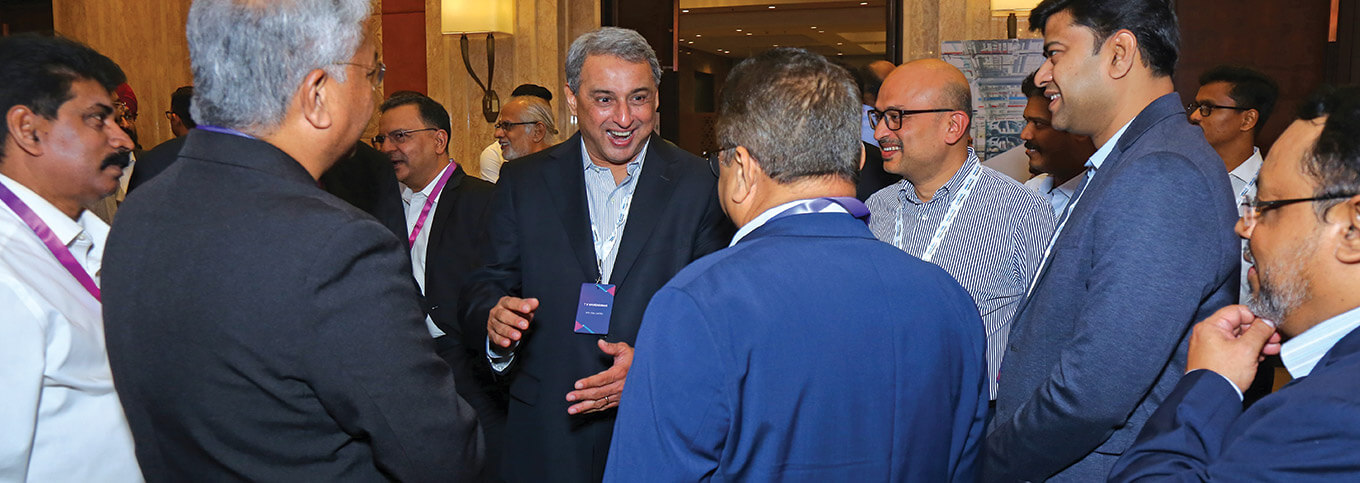
Tata Steel’s vendor partners provide operational leverage to optimise the value chain, be costcompetitive, and exceed customer expectations. Tata Steel remains committed to preserve the health, safety, and human rights of its vendor partners and embed sustainability in its supply chain through responsible sourcing, circular economy, and technology deployment.
Tata Steel collaborates with suppliers to establish a responsible supply chain through the Tata Steel Business Associate Code of Conduct (TSBACoC) and the Responsible Supply Chain Policy framework, emphasising the four principles: Fair Business Practices, Health & Safety, Human Rights, and Environmental Protection.
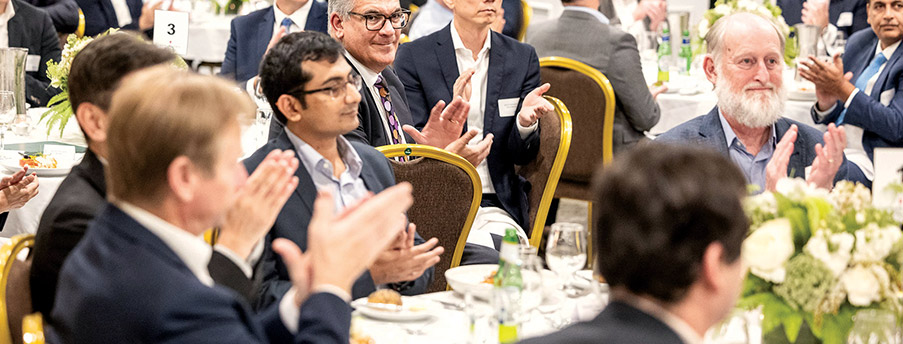
Through various cross-functional initiatives, such as Supplier Relationship Management (SRM), Vendor Development (VD), and Vendor Capability Advancement Programme (VCAP), Tata Steel maximises value creation through collaboration with strategic suppliers and continuously working with its suppliers to improve their capability. For its new vendors, Tata Steel has institutionalised the Swagat Programme for their smooth and faster onboarding. Driving indigenisation and localisation of critical commodities and spares are key focus areas for Tata Steel. To address vendor grievances, Tata Steel has provisioned for platforms like Speak Up (a toll-free helpline) and Procare helpdesk service and a Vendor Grievance Redressal Committee.
Supplier Relationship Management (SRM) is Tata Steel’s flagship programme for its strategic supplier partners. Technology Day sessions are conducted regularly to understand their best practices across various domains such as quality, delivery, productivity, safety, technology and sustainability. The ‘CEO to CEO Connect’ programme and interactions with the VPs and CPO facilitate valuable insights into the strategic suppliers’ future growth plans. The VCAP is designed to support vendor partners in fostering a culture of continuous improvement, thereby cultivating a competitive vendor base with improved productivity, safety standards, delivery efficiency product quality, and sustainability performance.
During FY2023-24, six Technology Day sessions were organised, 26 interactive CEO to CEO Connect sessions were conducted with vendor partners across different segments, 75 vendor development programmes were conducted across various locations on improvement projects to enhance the ease of doing business and their sustainability performance. The Company undertook indigenisation of items worth ₹558 crore across raw materials, bulk items and maintenance, repair, and operations spares, thereby deepening its relationship with local vendors.
As of FY2023-24, Tata Steel has engaged with 36 strategic suppliers under the SRM programme. VCAP has impacted over 1,000 vendor partners, benefitting over 25,000 contract workers through its focused initiatives. 670 critical suppliers (95%) have been assessed as per the Responsible Supply Chain Framework, with a goal to cover all by FY2029-30.
Nearly 33% of the Company’s suppliers in India are local, of which 85 are AA (Affirmative Action) and DP vendors (Displaced Persons due to Tata Steel's greenfield projects). Tata Steel has created incubation centres to develop these vendors’ capabilities and has provided them with special opportunities such as the right of first refusal to match L1 prices, special waivers on bank guarantees and penalties, improved payment terms, and issuing letters of intent. Tata Steel also conducts targeted mentoring programmes like Saathi & Guide, VCAP, Performance Review, listening posts, and direct interaction with the leadership team. In FY2023-24, the business volume generated by these vendors surged to approximately ₹151 crore, marking a notable increase of ~36% compared to FY2022-23.
Tata Steel maintains regular dialogue with governments across its operating geographies to address concerns related to current and future policies and regulations and ensure smooth business operations. This engagement is crucial, as it ensures businesses remain compliant and operational amid changing policies while working collaboratively with governmental agencies to build a supportive ecosystem for business.
Tata Steel's approach involves partnering with government entities to influence the formulation of policies and regulations that spur growth within the industrial sector, particularly the steel sector. The Company champions introducing new policies or modifications to existing ones at the national and regional levels, aiming to foster an environment supporting India's overall development. Tata Steel's efforts extend to collaborating with think tanks and industry experts to understand complex issues better and integrate global best practices into its strategies.

Focus areas include streamlining the ease and cost of doing business by alleviating industry compliance burdens, leading the way in sustainability to ensure progressive, sustainable development, and concentrating on technological advances, innovation, demand generation, product portfolio enhancement, and capacity building.
Some of the key issues on which Tata Steel engaged during FY2023-24 are as follows:
- The emerging global trade architecture and free trade agreements under negotiation to ensure a level playing field in both the domestic and global markets
- Boost steel demand to ensure the industry's growth
- Ministry of Steel for the successful launch and implementation of Production-Linked Incentive (PLI) Scheme for Specialty Steel and successful launch of Make in India label for steel products
- Ministry of Coal and Ministry of Mines to ensure availability of coking coal for domestic steel industry while trying to ensure the mining sector is not excessively taxed
- Department for Promotion of Industry and Internal Trade (DPIIT) for laying out the National Logistics Master Plan for the proposed steel clusters and all relevant stakeholders to reduce the costs and improve the efficiency of the overall logistics infrastructure in the country (PM Gati Shakti)
- There has been a lot of work around sustainability. These include working with Ministry of Steel on designing the taxonomy for green steel and creating the demand for green steel; the Bureau of Energy Efficiency for developing the National Carbon Market and Ministry of New & Renewable Energy on the National Green Hydrogen Mission
- Developing a strong regulatory framework for the scrap sector
Through these efforts, the Company ensures a policy environment that fosters industry growth, and promotes sustainable, competitive practices.
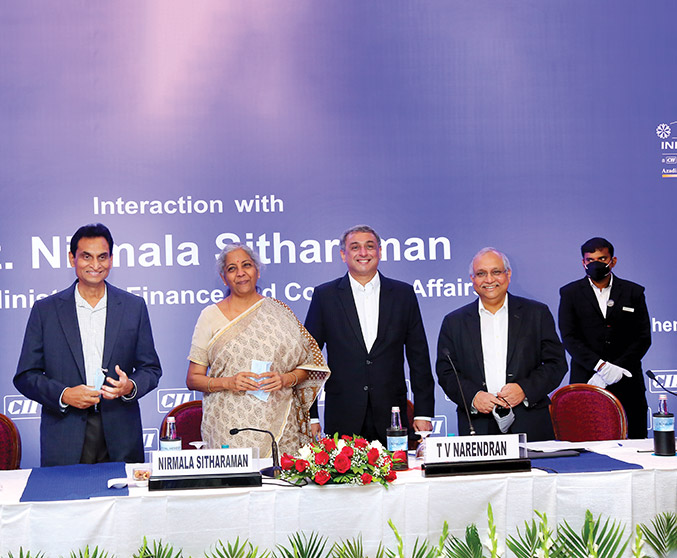
Tata Steel is steadfast in providing fair wages, establishing a collaborative consultation system, implementing self-supervised organisational structures, and offering its employees robust reward and recognition schemes. Tata Steel is focused on ensuring its employees' health, safety, and overall wellbeing, attracting and retaining a diverse workforce, creating an inclusive and positive work environment, sourcing labour locally, and implementing welfare practices for the non-officer staff.
The significance of Tata Steel's relationship with employees cannot be understated, as their contributions are fundamental to the Company's success. They are vital in implementing the strategies and driving sustainable business growth.
To foster this relationship, Tata Steel engages with its employees in various ways, including monthly online meetings with the Chief Executive Officer & Managing Director and frequent informal interactions with the senior leadership. Employee engagement surveys, Employee Net Promoter Score surveys, and joint forums between employee unions and management are additional means to connect and understand the employees' needs. The Company has taken various initiatives towards betterment of employees.
Please refer to the Human Capital chapter in this report.
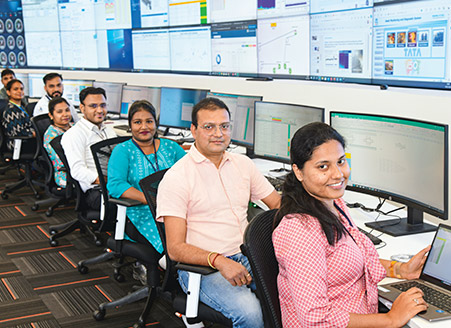
Tata Steel is committed to ensuring the long-term improvement of community well-being in its operating areas. The Company focuses on creating development models that elevate those often overlooked and those living close to its operations. By addressing critical development issues at a national level with scalable models, Tata Steel aims to set a precedent for positive change. Understanding the importance of harmonious relationships is fundamental to its approach. A supportive working environment fosters social solidarity, harmony, and peace, which helps prevent any form of hostility or community dissent.
Tata Steel's engagement strategy involves implementing various Community Development models that address the comprehensive needs of the communities in its operational regions. These models aim to solve key national development issues and serve as inspirational development benchmarks. The Company also prioritises public engagement by holding consultations before any business expansion.
Its thrust areas include ensuring the operational safety of the communities, maintaining ongoing outreach efforts, and supporting a range of initiatives aimed at improving public health, nutrition, water access and conservation, sanitation, education, livelihoods, and sporting talent. Tata Steel also commits to enhancing the quality of life for people with disabilities, building essential public infrastructure, and fostering grassroots leadership, all of which contribute to the dignity and betterment of the communities it serves.
During FY2023-24, the Company has taken various initiatives towards the betterment of community which it serves. Please refer to the section 'Fostering Community for Positive Social Impact'.
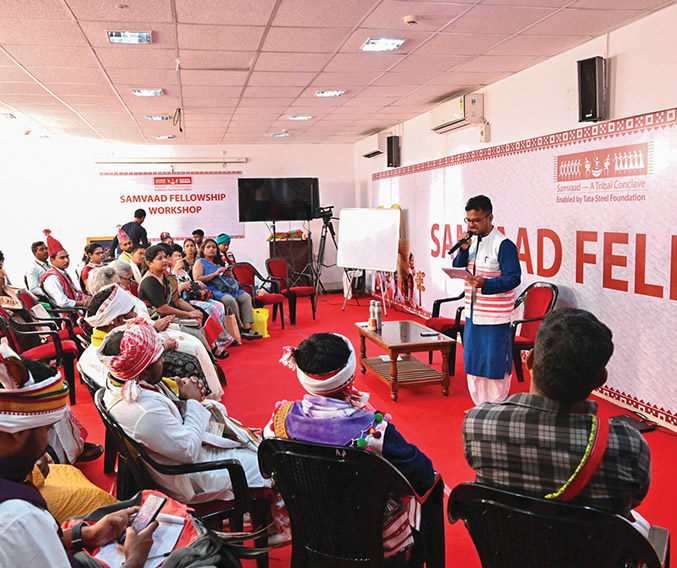
Tata Steel is committed to disseminating relevant information and updates to all its stakeholders, underscoring the importance of complete transparency and openness in its engagement with the media. Its critical role in broadening its outreach is at the heart of the Company's relationship with the media. This partnership enables Tata Steel to effectively communicate its brand vision and key initiatives, enhancing its corporate equity among society and various stakeholders.
Tata Steel engages with the media to maintain a dynamic dialogue by leveraging various touchpoints, including press releases, press conferences, and media get-togethers. The Company is dedicated to swiftly addressing media queries, organising interviews with its senior leadership, and enabling insightful articles that reflect thought leadership. The Company also organises sports engagement activities and familiarisation visits to its manufacturing and raw material sites, demonstrating its commitment to openness and proactive relationship building. In FY2023-24, Tata Steel organised 75+ leadership interviews, 65+ press conferences and media gettogethers, and 15 familiarisation visits.
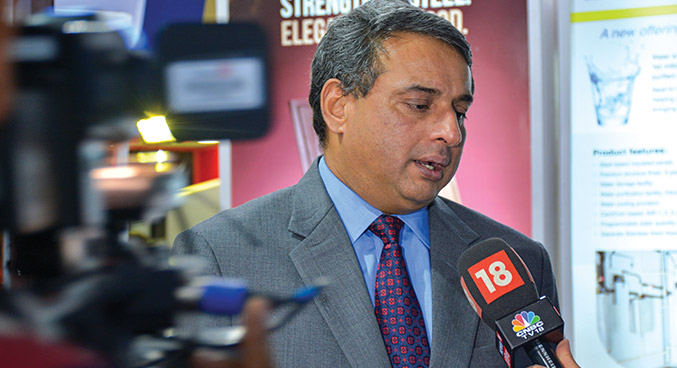
Tata Steel's communication is focused on themes of importance to the Company, such as health, safety, human rights, DE&I (Diversity, Equity, and Inclusion), innovation, technology, business excellence, financial performance, and sustainability.
Proactive media engagement and driving compelling storytelling contribute towards achieving the goal of positioning Tata Steel as the most respected and valuable steel company globally
Tata Steel recognises the significance of relationships with industry bodies, viewing them as key to developing networks, fostering consensus, and offering a united and agreeable stance to the government on various policy interventions. The Company actively engages in sector-specific and industrywide collaborations to tackle crucial policy issues affecting sectors such as mining, manufacturing, trade, finance, and sustainability.
To facilitate this engagement, Tata Steel participates in conferences and seminars organised by industry bodies and holds memberships in both national and regional committees and subcommittees, where critical industry issues are deliberated upon.

Tata Steel places a strong emphasis on addressing manufacturing and mining-related issues including regulatory clearances, auctions, labour challenges, logistics, and productionlinked incentives, which have a profound impact on its operations. Additionally, trade and finance issues such as Free Trade Agreements (FTAs), ensuring a level playing field, creating demand, addressing tariff and non-tariff barriers, Goods and Services Tax (GST), and the Insolvency and Bankruptcy Code (IBC) are prioritised. The Company also focuses on sustainability and the transition to low-carbon operations as a means to mitigate risks associated with climate change and water.
In FY2023-24, Tata Steel partnered with constructsteel and INSDAG (Institute for Steel Development and Growth) to promote the use of flat products in India's construction segments.